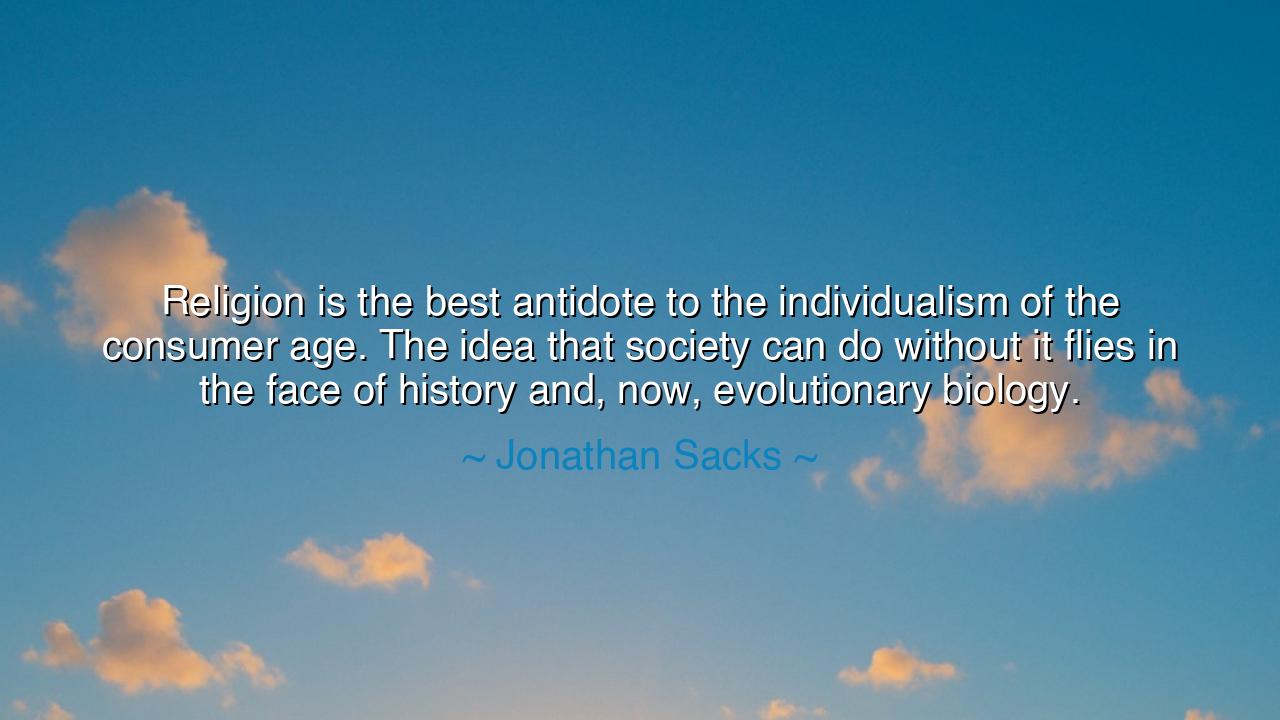
Religion is the best antidote to the individualism of the
Religion is the best antidote to the individualism of the consumer age. The idea that society can do without it flies in the face of history and, now, evolutionary biology.






Jonathan Sacks, sage and servant of the human spirit, declared with piercing clarity: “Religion is the best antidote to the individualism of the consumer age. The idea that society can do without it flies in the face of history and, now, evolutionary biology.” In these words he names a truth that echoes across centuries: that religion, with its call to community, sacrifice, and shared meaning, is the remedy to the emptiness of self-absorption. Where the consumer age teaches “me” and “mine,” faith teaches “we” and “ours.” Where consumption isolates, religion unites.
The ancients knew this wisdom well. Long before markets and machines, tribes gathered around fire and altar. They lifted their voices in prayer, shared rituals, and bound themselves not only to the living but to the ancestors and the unborn. In doing so, they forged bonds stronger than hunger, stronger than fear. This was the beginning of civilization itself. To live without religion—without shared symbols, shared laws, shared devotion—was never the way of humankind. Thus Sacks reminds us: history itself testifies that religion has been the root of community and the soil of culture.
Consider the story of the early Christians in Rome. Surrounded by an empire drunk with power, wealth, and entertainment, they chose a different path. They shared food with the hungry, rescued abandoned infants, and honored even the poor as children of God. While Rome exalted consumption and spectacle, these believers built community, and through that community, they transformed history. Their strength lay not in individual pleasure, but in collective faith. This is precisely the contrast Sacks speaks of: religion as antidote to the loneliness of consumerism.
Even modern science whispers this truth. Evolutionary biology teaches that humans survived not by the strength of the solitary, but by the cooperation of the group. Altruism, sacrifice, and loyalty ensured survival. Religion, with its rituals of belonging and its laws of justice, became the framework through which such cooperation flourished. Sacks names this when he says society cannot “do without” religion, for to remove it is to uproot one of the deepest foundations of human survival.
Yet in our own age, the consumer spirit seduces the heart. It whispers that happiness is found in possessions, in endless choice, in living for oneself alone. But the more we consume, the emptier we become. Loneliness rises, families fracture, nations divide. Against this sickness, religion stands as antidote: reminding us that we are not isolated atoms, but part of a greater body, bound by duty, compassion, and reverence for something beyond ourselves.
The meaning of Sacks’s words is both urgent and eternal. He does not claim that religion is flawless, for it has been misused by power. But he declares that its essence—its capacity to bind, to lift, to remind us of the sacred—remains essential. Without it, humanity risks drowning in the shallow waters of consumer individualism, cut off from the deeper currents of meaning.
The lesson is clear: if you would live fully, do not let the consumer age make you a slave of the self. Seek community. Seek meaning. Whether through religion, ritual, or shared purpose, anchor yourself in something greater than your own appetite. For to live only for yourself is to live half a life, but to live in communion with others is to walk in the fullness of humanity.
Practical actions follow. Return to traditions that bind, not just entertain. Gather with others in worship, service, or celebration. Resist the constant lure of consumption by practicing gratitude and generosity. And when tempted by the empty call of individualism, remember Sacks’s wisdom: religion is the antidote. It heals, it unites, it gives life beyond the self.
O seeker, carry this teaching: no society has endured without the sacred. To forget it is to forget ourselves. To embrace it is to walk the path of our ancestors, the path of survival, of flourishing, of truth. In an age of isolation, choose communion. In an age of consumption, choose sacrifice. In an age of self, choose God.






AAdministratorAdministrator
Welcome, honored guests. Please leave a comment, we will respond soon